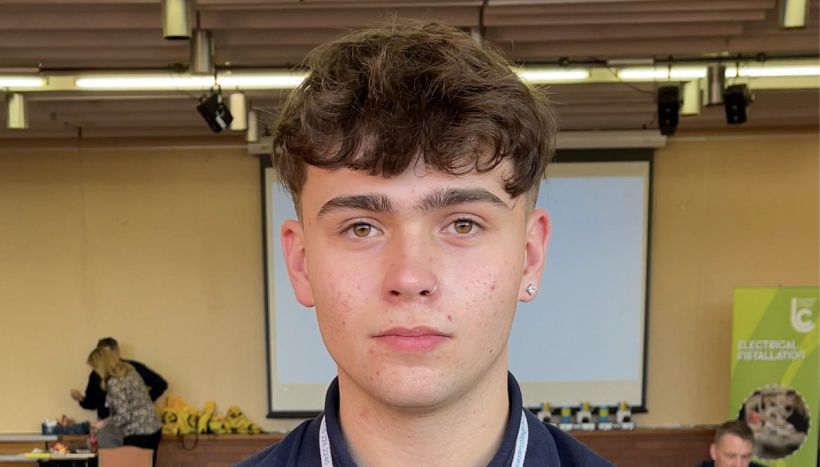T Levels – sparking the best of both worlds
Kian knew he wanted to get into electrics, but wanted to study the theory behind it before taking on the practical work. The T Level offered him the chance to learn the science of electrical installation as well as put it into practice. Kian Chapman completed his BSE T Level Electrical installation in June 2023.
T Levels are relatively new, two-year vocational qualification which are equivalent to three A Levels. They help to prepare students to enter work with good technical skills and knowledge, or go on to higher education. Kian found out about them after completing his GCSEs.
“I didn’t know much about them but in school I didn’t really do practical stuff, I was more book-smart, but I still wanted to get into the electrical industry, so I was looking for ways to that. I’d heard about level 2 and 3 BTECs but they weren’t available. Then I heard about T Levels so I researched what a T Level was and found they’re 80% coursework and 20% practical so I’m still getting the practical knowledge but more theory than with other courses.”
Knowledge and skills wanted by employers
T Levels are based on the same standards as apprenticeships, designed by employers with the Institute for Apprenticeships and Technical Education to make sure young people under 19 develop the knowledge and skills required by employers after their GCSEs. T Levels were perfect for Kian as he wanted to keep studying and learning but also gain some practical experience.
“I didn’t fancy being on site all the time straight away. I’d rather know all the stuff behind it before I actually get into the practical side and just doing it before I actually know why I’m doing it. I’d rather do the theory about it first.”
“The course is quite similar in some aspects to GCSEs where it’s a lot of writing and you do some actual hands on work but it’s more like you’re writing, you’re reading books, watching presentations. You’ve still got topics like you have in GCSEs and in the first year it’s all about the wider subject and about everything, whereas the second year it’s more electrical based and actually doing electrics. You’ve still got all the routes that it’s split into.”
Lots of options
Kian enjoyed science at secondary school and wanted to develop that knowledge to get a job in the electrical industry.
“I liked science at secondary school, and I wanted to get into electrics because the industry’s massive at the moment; everyone wants to do electrics. Everything’s turning electrical – cars, homes, and there’s different ways of getting electricity.”
“If you do this course, you can branch off into any area of electrics. You can go to university and carry it on or go straight into work like installing solar panels. There’s lots of options.”
A good middle ground
Kian feels that he found the right balance of theory learning and practical experience on this course and says it’s a good option for those who enjoy studying but also want to get some hands-on experience.
“I’d 100 per cent recommend this course at Leicester College because if you’re like me, and didn’t want to go straight into practical work, like getting hands-on but not too much, and you’re also book-smart it’s a good middle ground where you can do all your reading and learning about sciences but then you can also pick up an screwdriver or drill and do some practical work as well.”
